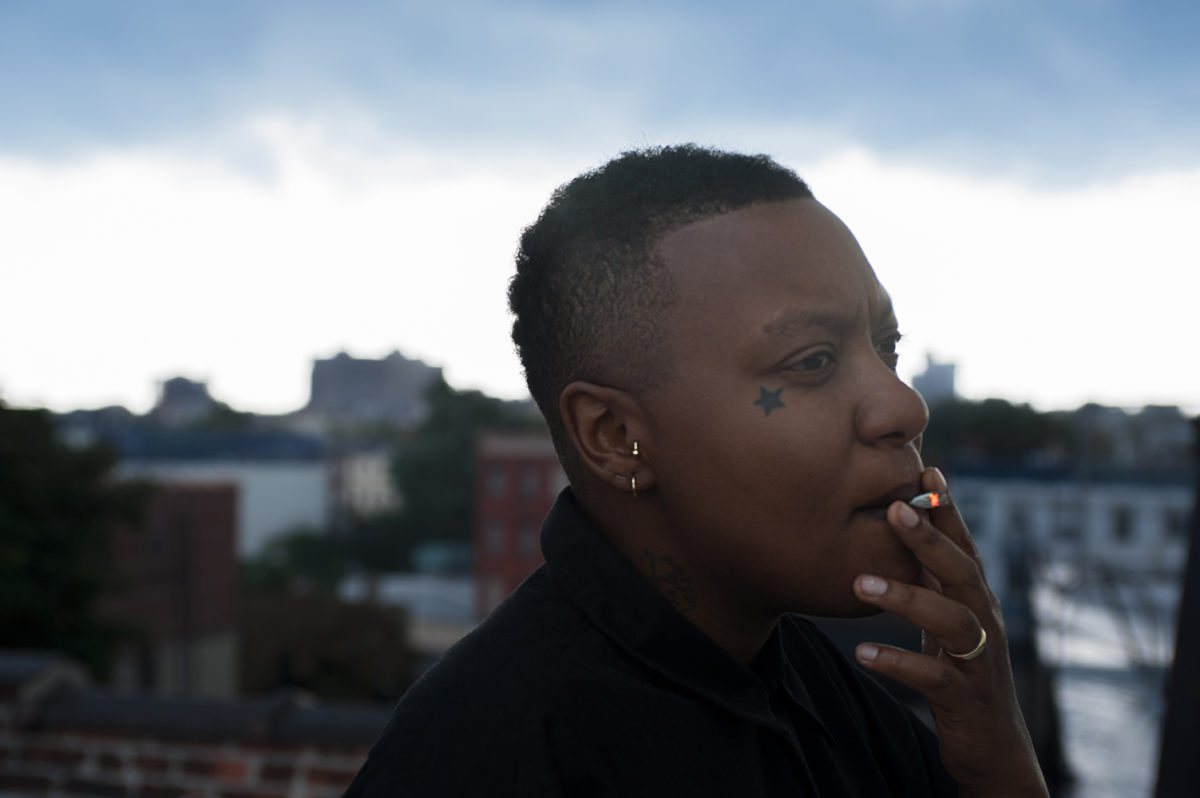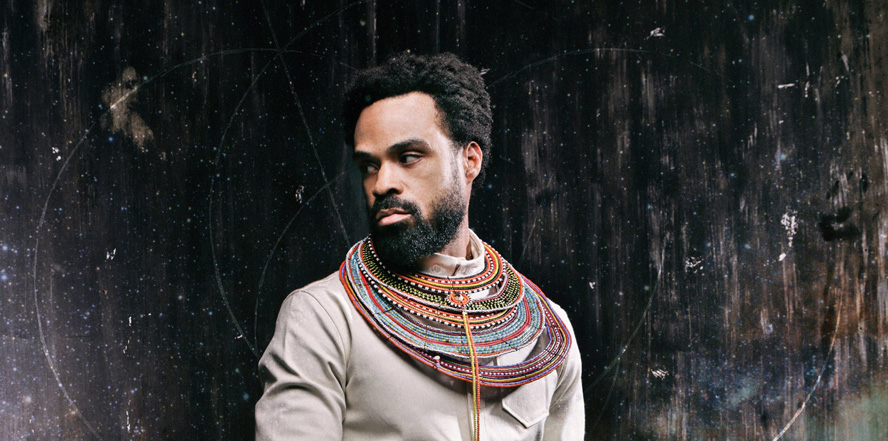NYC Winter Jazzfest Presents
Jan
04
with Meshell Ndegeocello & special guest Bilal
Fri January 4th, 2019
7:30PM
Main Space
Minimum Age: 18+
Doors Open: 6:30PM
Show Time: 7:30PM
Event Ticket: $35
Day of Show: $45
1
Thing Called Life: Prince Reimagined

Featuring Meshell Ndegeocello with Deantoni Parks, Nicci Kasper, Chris Bruce, Jebin Bruni, Abraham Rounds, Justin Hicks, and J. Hoard.
Meshell Ndegeocello

Meshell Ndegeocello official site | Meshell Ndegeocello on Facebook | Meshell Ndegeocello on Twitter | Meshell Ndegeocello on Instagram
There are albums dedicated to personal pain, or political protest, love, death, nostalgia, rage. There are those that are simply fun, glossy, the soundtrack to a good time. Some are exploratory, a musical journey, shapeshifting soundmaking, a new way to do an old thing. An artist can make a choice about concept and content, or heed a vision, follow their muse or their manager. But in times so extreme and overwhelming, when there is no known expression for the feeling, no satisfactory direction for art or action, then they might take refuge in a process, a ritual, something familiar, the shape and sound of which recall another time altogether, so that they can weather the present long enough to call it the past. Some albums are testimony, some confessions, and some are escape. “Ventriloquism”, the latest album from MESHELL NDEGEOCELLO, is a place, like its process, to take refuge from one storm too many.
Musically, Ventriloquism has the hallmarks of all of Ndegeocello’s work, lush and investigative, subversive and sublime. As always, she pays tribute to her diverse influences and in these eleven covers, we hear them layered over one another. Ndegeocello filters “Tender Love” through a folky, Californian filter and brings Vaudevillian accents to “Sensitivity”. She recreates Smooth Operator in five, and turns “Private Dancer” into a sultry waltz. The reimagining affords not just a new musical experience but also a comment on the narrow expectations of sounds and structures for black artists and black music.
“Early on in my career, I was told to make the same kind of album again and again, and when I didn’t do that, I lost support. There isn’t much diversity within genres, which are ghettoizing themselves, and I liked the idea of turning hits I loved into something even just a little less familiar or formulaic. It was an opportunity to pay a new kind of tribute.”
This album was recorded in Los Angeles with the familiar family of partners and players that Meshell has worked with for years. Chris Bruce plays guitar, Abraham Rounds is on drums, Jebin Bruni co-produced the album and plays keys. S. Husky Huskolds engineered while Pete Min mixed and mastered. Lasting and collaborative relationships with her fellow musicians is among the most important parts of music making for Meshell, prompting her to say on more than one occasion: “Meshell Ndegeocello is a band”.
Some tracks were selected for their reflections: The album opens with “I Wonder If I Take You Home”, which marked the early influence of Prince and Hip Hop on commercial pop, and was a reference for Ndegeocello’s own “If Thats Your Boyfriend”. Constantly asked to be “funky”, Meshell includes “Atomic Dog” as a reminder that the heart of funk is ineffable and irreverent, not just acted in showy flourishes, slaps, or noodling. Other songs offered an outlet for plain emotional truths: “Waterfalls” was stripped down, and delivered as an honest and needed personal lament. “Sometimes It Snows In April” has an extended intro, an accidental result of the band’s desire to delay the new and inevitable sadness of the song. “Funny How Time Flies” approaches sarcasm in its ominous and lonely sounds, exemplifying how these times – personally for Meshell, politically for many – are neither flying nor fun.
“The year around the recording of this album was so disorienting and dispiriting for me personally and for so many people I know and spoke to all the time. I looked for a way to make something that was light while things around me were so dark, a musical place to go that reminded me of another, brighter time.”
A final note to the listener, Meshell chose art for the album package that hints at what’s inside: A graphic V, a hidden M, the artwork is symbolic, sexy, and calls on the language of protest of the era these songs were mined from. With no words or pictures, the artwork is itself a declaration that even when you cannot imagine what to say, if you come together to create, you can find transformation and reinvention, the old can become new, today can become tomorrow.
A portion of the profits from this album will be donated to the American Civil Liberties Union.
special guest Bilal

Bilal Official Website | Bilal on Twitter | Bilal on Facebook | Bilal on Tumblr.com
Bilal Oliver was born and raised in Philadelphia, PA. Coming from what he describes as a “regular kind of neighborhood”, Bilal was first introduced to music when he attended a small local church. The congregation, made up of mostly family members, became his foremost musical outlet. In his later years, Bilal’s father introduced him to the jazz clubs around the city. It wasn’t until Bilal attended the Philadelphia High School for Creative Performing Arts that he really started taking his music seriously, realizing this was the direction he wanted to go with his life. While at the school, Bilal, along with his peers, began to experiment with songwriting and became completely enamored with Jazz. “I wanted to sing Jazz, play Jazz, and write Jazz tunes.” The effect of being immersed into a creative, music infused environment caused the young Bilal to interpret his voice as an instrument especially in the songs he began to write.
After high school, Bilal was accepted to the New School for Social Research, a prestigious avant-garde university in New York. While there, he studied Jazz and continued to develop his affinity for songwriting. Bilal was able to experience the nightlife of New York City by frequenting night clubs and gaining a true knowledge of the NYC music scene. While frequenting the famed Wetlands’ Nightclub, he became acquainted with The Roots, Q Tip, Common, Erykah Badu and Mos Def. Bilal would also take part in jam sessions with his New School professors and classmates. It was during one of these sessions that Bilal met Aaron Coleman of the Spin Doctors. The two hit it off and soon private jam sessions in Coleman’s home gave birth to a demo of songs that would land Bilal a record deal with Interscope.
Bilal was moving in the direction he desired and moving fast. He left the New School, focusing on his musical career and began creating music at the famed Electric Lady Studios. At this time, Common was working on his Like Water for Chocolate album at Electric Lady. Bilal, sitting in on the recording sessions, became an integral part of the album. Later sessions with Questlove of The Roots introduced Bilal to J Dilla and sparked a fruitful working relationship between the two. Once the album was near completion, label pressures coerced Bilal into working with more commercially prominent producers like Dr. Dre and Mike City. The album, First Born Second, was released in 2001, displaying a wide range of diverse musicality.
With a favorable response to his album, Bilal was swept up in what the media referred to a “Neo Soul” movement. Bilal didn’t feel the term fit. “I was trying to come from a Jazz perspective…. trying to write open ended tunes that could go in any direction when played live.” While touring, Bilal and his band started to morph the music into what he describe as a “jazz-fusion/rock type funk.” This musical freedom bled into the songwriting for Bilal’s next project, Love For Sale. This time around, Bilal worked with a myriad of new collaborators, from Sa-Ra to Denaun Porter to Nottz, even gathering a number of his former New School peers to participate. Interscope execs were less than enthused upon hearing the new record. Mysteriously, an unfinished version of the project was leaked.
The response from audiences and critics worldwide was overwhelmingly positive. For years, label politics prevented any significant progress to occur on a follow-up album. In spite of the setbacks of the last album, Bilal had a dedicated fan base and they wanted more. The encouraging feedback began to re-inspire Bilal to write songs again and he set out to accomplish what he had started in the beginning. Late 2009, Bilal announced his official second album will be released Summer 2010 via Los Angeles based label Plug Research Music. The new music promises to be progressive while still having its roots placed firmly in the jazz traditions that originally inspired Bilal’s music. Bilal describes the new material as “genre-bending music.”

